广东开心版英语六年级上册各单元学习重点
广东开心英语小学六年级上语法知识(Gogo开心学英语版)NEW

语法知识(Gogo开心学英语版)一、一般现在时一、一般现在时中第三人称单数作主语时谓语动词的使用一般现在时表示的是经常性的动作或现在的状态。
表示一般现在时的词有 always , usually , often , sometimes , never , every day , every week 等。
在一般现在时的句子中,当主语是第三人称以外的其他人时,谓语动词一律用原形。
当主语是第三人称单数时,谓语动词就要发生相应的变化,其规则是: 1、一般情况下,在原动词后面加-s构成。
如:get →gets 等。
I ______(get) up at 6:00 every day . → He _____(get) up at 6:00 every day .2、以o , sh , ch结尾的动词,在词尾加-es构成。
如 do→does(做) , go→goes(去) , wash→washes(洗), watch→watches(观看)等。
如:I often ______ (watch) TV in the evening .→ My mom often ______ (watch) TV in the evening .3、以辅音字母加y结尾的动词,将y改成i 后再加-es 。
如:study→studies 等。
We ________ (study) hard at school . → John _______(study) hard at school .注意:在句子中,如果使用了助动词 does , doesn’t , will , won’t , can , can’t , would , wouldn’t , must , mustn’t 等,尽管主语是第三人称单数,谓语动词也不用变化。
如:He doesn’t _________ (want ) to go shopping .Mike won’t __________ ( come ) to school tomorrow .二、现在进行时现在进行时表示现在进行或发生的动作。
Unit1-3复习知识点(素材)粤人版英语六年级上册
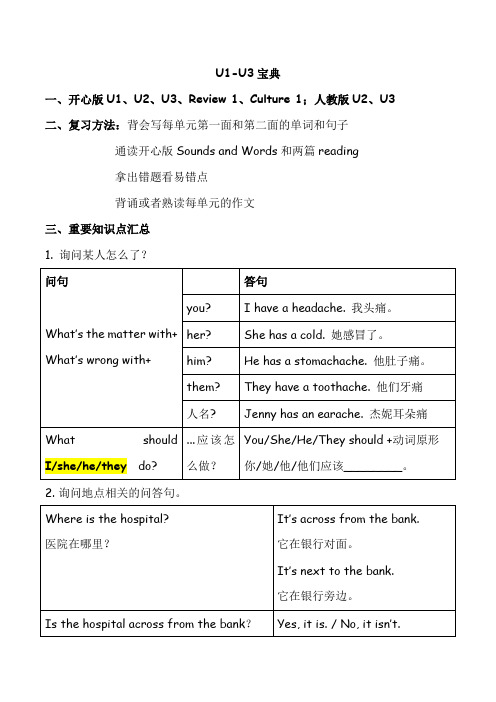
U1-U3宝典一、开心版U1、U2、U3、Review 1、Culture 1;人教版U2、U3二、复习方法:背会写每单元第一面和第二面的单词和句子通读开心版Sounds and Words和两篇reading拿出错题看易错点背诵或者熟读每单元的作文三、重要知识点汇总1. 询问某人怎么了?2.询问地点相关的问答句。
3.询问食物相关问答句。
一般疑问句:Is junk food bad for us? Yes, it is.垃圾食品对我们有坏处吗?是的。
Is plenty of water good for me? Yes, it is.充足的水对我们有好处吗?是的。
Is there enough food for them? No, there isn’t.这里的食物对他们来说足够吗?不,这的不足够。
4.询问动物的种类。
What kind of animals are snakes? They are reptiles.(注意划横线的部分要用复数,fish(鱼类)除外)What animals do you like? I like monkeys. (注意划横线的部分用复数)What animals does he/she like? He/She likes monkeys.*重点:什么动物是什么种类的?它们是_____类动物。
5.询问国家与城市的问答句。
(1)Where do you want to go this winter vacation? 这个寒假你想去哪里?I want to go to + 城市/国家. 我想去_______。
What do you want to do there? 你想在那里做什么?I want to + 动词词组. 我想在那里_______。
询问第三人称时,注意以下的动词变化。
Where does he/she want to go this winter vacation? 这寒假他/她想去哪?He/She wants to go to + 城市/国家. 他/她想去_______。
开心学英语六年级知识整理

广东版开心学英语六年级第一学期知识总汇一、动词过去式①规则的:⑴直接在词尾加ed:如:plant-planted watch--watched wash--washed cook---cooked listen--listened help---helpedpaint-painted play---played visit---visited walk--walked clean---cleaned stay---stayed talk--talked⑵直接在词尾加d:如:like—liked live—lived use—used move—moved close—closed dance--danced⑶把y改i , 再加ed:如:carry---carried study---studied⑷双写最后一个字母,再加ed 如:stop—stopped trip—tripped drop--dropped shop-shopped②不规则的:如: am\is ---was isn’t---wasn’t are ---were aren’t---weren’t do\does--- did don’t\doesn’t--- didn’t come ---came(来)ride ---rode(骑)write ---wrote(写)take ---took(拿)tell---told(告诉)forget---forgot(忘记) get ---got(得到)make --- made (做)eat --- ate(吃)drink--- drank(喝)sing--- sang(唱)feel-- -felt(觉得)see --- saw(看见)sit--- sat(坐)buy--- bought(买)say --- said(说)go ---went(去)have\has--- had(有)dig ---dug(挖)meet ---met(会面)swim---swam(游泳) buy ---bought(买)run---ran(跑) fly---flew(飞)teach---taught(教)③过去式与原形不变的:如:put---put(放)read---read(阅读)hurt---hurt(受伤)④Be动词现在式:am\ is\ are am\is----was (单数)过去式was\were are---were(复数)二、时间:过去式现在进行将来时\-------------------\-------------------\yesterday now tomorrow过去:last(week)上个(星期) , yesterday昨天, the day before yesterday前天this morning 这个下午before之前 just now刚才then 那时(动词用过去式) I cooked last week . Did she cook yesterday ?现在:now现在\today(今天)(用am\is\are+动词ing形式) I am cooking now . What are you doing now ?将来:today今天, tomorrow 明天, next(week) 下个(星期), the day after tomorrow后天,tonight今晚, later 稍后(用am\is\are+going to+ 动词原形或 will+ 动词原形)I am going to cook tomorrow . I will cook tomorrow .一般现在式:频率副词:every(day)每(天) , usually 通常, always总是,often 经常,sometimes,never,I cook every day . \ She cooks every day .三、可数名词的复数形式:①把y改i,再加es 如:strawberry---strawberries cherry---cherries dictionary---dictionarieshobby---hobbies body—bodies diary—diaries butterfly—butterflies ②以o,x,s,sh,ch, 结尾的在词尾加es如: peach---peaches box---box es glass---glasses bus---buses watch---watches③一般的直接在词尾加s 如:paper clip---paper clip s tree--trees④不规则的:如: sheep---sheep knife---knives wolf--wolves leaf--leaves this---these that---those foot---feet tooth---teeth child---children photo---photos people---people㈡动词现在分词(ing):(分词前面一定有be动词(am\is\are\was\were)①在词尾直接加ing如:think--- think ing 思考talk --- talking 谈话work --- work ing 工作do ---do ing 做go--- go ing 去 help---helping帮助wash --- wash ing 洗play---play ing 玩\打read --- read ing阅读②去掉e,再加ing如:move---moving have--having ice skate---ice skating take--taking ride--riding make--making③双写最的一个字母,再加ing如:put---putting dig---digging sit---sitting stop---stopping cut---cutting hop-hopping swim---swimming run---running shop---shopping jog---jogging get--getting用法:⑴I can help her\him\us\you\me\them . I play with her\him\us\you\me\them .This bedroom is for her\him\us\you\me\them .⑵The book is mine . It’s my book . This is our classroom . The classroom is ours .②在should, can, will, to, do\does, don’t\doesn’t, did\didn’t, Let’s, Please, help,make 这些词后面的动词要用动词原形。
广东版开心学英语六年级(上册)期末复习_每课重点单词短语_句子

Unit 1 Feeling Sick 重点单词&短语have a headache 头痛have a toothache 牙痛have a cold 感冒have a fever 发烧have a stomachache 肚子痛take some medicine 服药see the dentist 去看牙医stay in bed 躺在床上them 他们easy 容易的重点句型What’s wrong with you? 你怎么啦?I have a headache 头痛have a toothache 牙痛have a cold 感冒have a fever 发烧have a stomachache 肚子痛What’s wrong with him/her/Tony?He/She/Tony has …Please stay in bed.Please take some meidicine.You should take some medicine. You should see the dentist.Please +动词原形should+动词原形课文What’s wrong with you? 你怎么啦?I hurt my foot. 我的脚受伤了。
Let me have a look. 让我看一看。
Be careful next time. 下次小心。
I have a stomachache. 我肚子痛。
Please take some medicine. 请服药。
What’s the matter? 怎么了?I have a cold. 我感冒。
Please stay in bed. 请躺在床上。
What are they doing?他们正在做什么?They’re digging a well. 他们正在挖一口井。
Digging a well? 挖一口井?I can help them. 我可以帮助他们。
六年级开心版英语上册

六年级开心版英语上册一、单词。
1. 重点单词分类。
- 人物类:如student(学生)、teacher(教师)、friend(朋友)等。
可以制作单词卡片,一面写单词,一面画图或者写例句,方便记忆。
例如:My friend is very kind.- 动物类:如果教材中有涉及,像cat(猫)、dog(狗)、elephant(大象)等。
记忆方法可以采用联想记忆,比如想象猫柔软的毛,狗忠诚的样子等。
- 日常用品类:pen(钢笔)、book(书)、bag(书包)等。
可以将这些单词与日常生活联系起来,每天上学前可以说一遍书包里的物品对应的英文单词。
- 形容词类:big(大的)、small(小的)、tall(高的)、short(矮的)等。
通过对比记忆,如big和small是一对反义词,tall和short也是。
2. 单词记忆技巧。
- 利用音标记忆。
学会音标后,很多单词可以根据发音规则来拼写。
例如,“cat”,根据音标[kæt],很容易记住字母组合的发音和拼写。
- 记忆单词的复数形式。
对于可数名词,要掌握其复数的变化规则。
一般情况加-s,如books;以s、x、ch、sh结尾的加 -es,如boxes;以辅音字母 + y结尾的,把y变为i加 -es,如baby - babies。
二、句型。
1. 日常问候句型。
- How are you?(你好吗?)的回答可以是I'm fine, thank you. And you?(我很好,谢谢你。
你呢?)- Good morning/afternoon/evening.(早上/下午/晚上好。
)这是不同时间段的问候语,要注意区分使用。
2. 询问身份句型。
- What's your name?(你叫什么名字?)回答:My name is...(我的名字是……)- What do you do?(你是做什么的?)回答:I'm a student/teacher...(我是一名学生/教师……)3. 描述事物句型。
广东开心英语小学六年级上语法知识Gogo开心学英语版
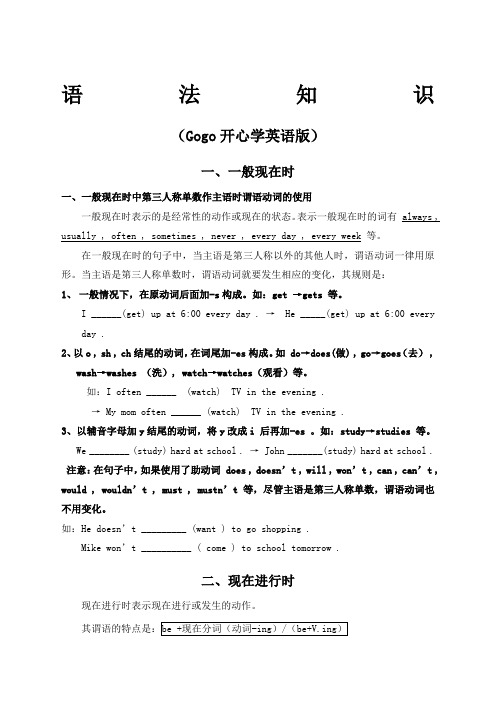
语法知识(Gogo开心学英语版)一、一般现在时一、一般现在时中第三人称单数作主语时谓语动词的使用一般现在时表示的是经常性的动作或现在的状态。
表示一般现在时的词有 always , usually , often , sometimes , never , every day , every week 等。
在一般现在时的句子中,当主语是第三人称以外的其他人时,谓语动词一律用原形。
当主语是第三人称单数时,谓语动词就要发生相应的变化,其规则是:1、一般情况下,在原动词后面加-s构成。
如:get →gets 等。
I ______(get) up at 6:00 every day . → He _____(get) up at 6:00 everyday .2、以o , sh , ch结尾的动词,在词尾加-es构成。
如 do→does(做) , go→goes(去) ,wash→washes (洗), watch→watches(观看)等。
如:I often ______ (watch) TV in the evening .→ My mom often ______ (watch) TV in the evening .3、以辅音字母加y结尾的动词,将y改成i 后再加-es 。
如:study→studies 等。
We ________ (study) hard at school . → John _______(study) hard at school . 注意:在句子中,如果使用了助动词 does , does n’t , will , won’t , can , can’t , would , wouldn’t , must , mustn’t 等,尽管主语是第三人称单数,谓语动词也不用变化。
如:He doesn’t _________ (want ) to go shopping .Mike won’t __________ ( come ) to school tomorrow .二、现在进行时现在进行时表示现在进行或发生的动作。
六年级上册开心版英语第三单元

第一节:引言1. 学习英语的重要性在当今全球化的背景下,学习英语已经成为一种基本能力。
我们不仅需要用英语与世界各地的人进行交流,还需要通过英语来获取更多的知识和信息。
学习英语对我们来说是非常重要的。
2. 本文要讨论的主题本文将重点介绍六年级上册开心版英语第三单元的主要内容,包括词汇、语法、阅读和听力练习等方面,以帮助学生更好地学习和掌握这一单元的知识。
第二节:词汇学习1. 本单元的重点词汇本单元的重点词汇包括一些关于家庭成员、食物、动物和颜色等方面的词汇。
学生们需要通过课堂学习和课外复习来掌握这些词汇,并能够正确地运用它们。
2. 如何进行词汇记忆学生们可以通过多次朗读、默写和运用这些词汇来巩固记忆。
老师和家长也可以在日常生活中与学生进行互动,帮助他们在实际情境中运用这些词汇。
第三节:语法学习1. 本单元的语法知识本单元主要介绍了一般现在时的肯定句和否定句的构成形式,以及其相关的动词变化规则。
学生们需要通过练习来掌握这些语法知识,并能够在实际运用中正确地使用它们。
2. 如何进行语法练习老师可以设计一些有趣的语法练习,例如填空、连线和造句等,来帮助学生巩固所学的语法知识。
学生们也可以通过阅读一些简单的英语文章或故事来提高语法运用能力。
第四节:阅读练习1. 本单元的阅读内容本单元的阅读内容主要包括一些有关家庭成员、食物和动物等方面的短文。
学生们需要通过阅读这些短文来提高他们的阅读理解能力,并能够准确地回答相关问题。
2. 如何进行阅读训练学生们可以通过反复阅读、理解文中的内容,并尝试回答问题来进行阅读训练。
老师可以提供一些与短文相关的讨论话题,帮助学生更好地理解和运用所学内容。
第五节:听力练习1. 本单元的听力内容本单元的听力内容主要包括一些关于日常生活和学校活动的对话和短文。
学生们需要通过听力练习来提高他们的听力理解能力,并能够准确地听懂和回答相关问题。
2. 如何进行听力训练学生们可以通过模仿、跟读和听力理解练习来进行听力训练。
(完整word版)广东开心英语小学六年级上语法知识(Gogo开心学英语版)
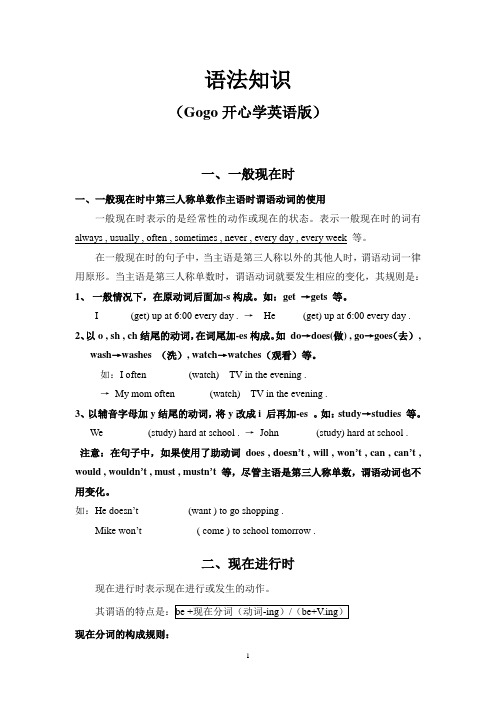
语法知识(Gogo开心学英语版)一、一般现在时一、一般现在时中第三人称单数作主语时谓语动词的使用一般现在时表示的是经常性的动作或现在的状态。
表示一般现在时的词有always , usually , often , sometimes , never , every day , every week 等。
在一般现在时的句子中,当主语是第三人称以外的其他人时,谓语动词一律用原形。
当主语是第三人称单数时,谓语动词就要发生相应的变化,其规则是:1、一般情况下,在原动词后面加-s构成。
如:get →gets 等。
I ______(get) up at 6:00 every day . →He _____(get) up at 6:00 every day .2、以o , sh , ch结尾的动词,在词尾加-es构成。
如do→does(做) , go→goes(去),wash→washes (洗), watch→watches(观看)等。
如:I often ______ (watch) TV in the evening .→My mom often ______ (watch) TV in the evening .3、以辅音字母加y结尾的动词,将y改成i 后再加-es 。
如:study→studies 等。
We ________ (study) hard at school . →John _______(study) hard at school .注意:在句子中,如果使用了助动词does , does n’t , will , won’t , can , can’t , would , wouldn’t , must , mustn’t 等,尽管主语是第三人称单数,谓语动词也不用变化。
如:He doesn’t _________ (want ) to go shopping .Mike won’t __________ ( come ) to school tomorrow .二、现在进行时现在进行时表示现在进行或发生的动作。
广东开心英语六年级上册全书各单元重点单词、词组和句子复习资料整理.docx

重点单词、词组和句子Unit 1:1 wrote a long letter•重点单词、词组:l.a piece of candy 一块糖2.a carton of ice cream 一亠盒冰淇淋3.a pair of socks 一双袜子4.a bag of chips 一袋薯条5.a bottle of shampoo 一瓶洗发水6.a bar of soap 一块肥皂7.a box of tissues 一盒纸巾8.a roll of toilet paper 一卷手纸9.at 在10.store 商店ll.buy(bought)买12.get(got)买至U13.have(had)有14.bring(brought)带来15.long 长的16.send 寄17.idea 主意Sounds and words:1.chair 椅子2.stairs 楼梯3.bear 熊4.pear 梨5.where 哪里6.there 那里重点句子:(Target)1.Did you buy a bag of chips at the store?你在商店买了一包薯条吗?Yes, I did.是的,我买了No, I didrft.不,我没买。
2.1 bought a bottle of shampoo.我买了一瓶洗发水。
3.OK. I'll go to the store and get a bag of chips・我将/准备去商店买一包薯条。
4.I'm going to get a box of tissues, too.我也将/打算买一盒纸巾。
5」'll go too. I'm going to get a piece of candy!我也将去。
我将/准备买一块糖!难点句了:(Conversation)::LI wrote a long letter.我写了一封长信。
广东开心英语小学六年级上第二单元

Thur.
Friday
I always take the taxi to the pool. I never take the subway to the pool.
句型操练
How do you usually get to school? I usually take the subway never the taxi to school. sometimes ride my bike always
go to the swimming pool
当频率副词遇上交通工具。。。
I take the bus to school.
Monday Tuesday Wed.
Thur.
Friday
I usually take the bus to school.
Monday Tuesday Wed.
Thur.
Do you ever ride your bike to school? Yes, I usually ride my bike. Do you ever ride your bike to school? Yes, I usually ride my bike. Usually, usually, usually I ride my bike. Usually, usually, usually I ride my bike.
Friday
I usually take the bus to school. I sometimes ride the bike to school.
Monday Tuesday Wed.
Thur.
Friday
I always take the taxi to the mall.
广东开心英语六年级上册知识点汇总
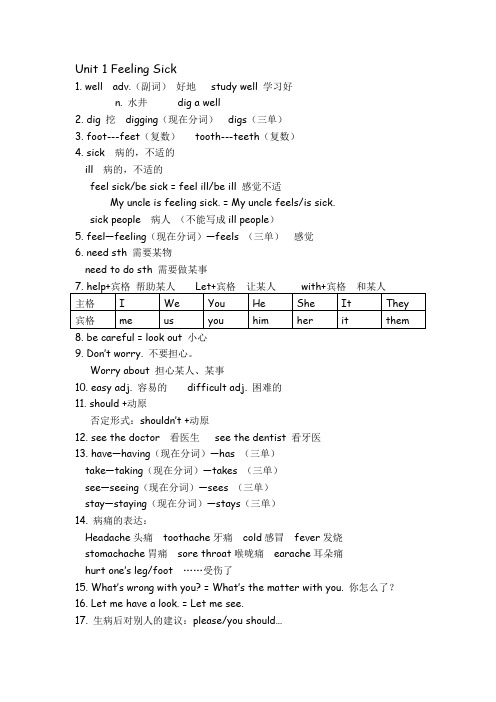
Unit 1 Feeling Sick1. well adv.(副词)好地study well 学习好n. 水井dig a well2. dig 挖digging(现在分词)digs(三单)3. foot---feet(复数)tooth---teeth(复数)4. sick 病的,不适的ill 病的,不适的feel sick/be sick = feel ill/be ill 感觉不适My uncle is feeling sick. = My uncle feels/is sick.sick people 病人(不能写成ill people)5. feel—feeling(现在分词)—feels (三单)感觉6. need sth 需要某物need to do sth 需要做某事8. be careful = look out 小心9. Don’t worry. 不要担心。
Worry about 担心某人、某事10. easy adj. 容易的difficult adj. 困难的11. should +动原否定形式:shouldn’t +动原12. see the doctor 看医生see the dentist 看牙医13. have—having(现在分词)—has (三单)take—taking(现在分词)—takes (三单)see—seeing(现在分词)—sees (三单)stay—staying(现在分词)—stays(三单)14. 病痛的表达:Headache头痛toothache牙痛cold感冒fever发烧stomachache胃痛sore throat喉咙痛earache耳朵痛hurt one’s leg/foot ……受伤了15. What’s wrong with you? = What’s the matter with you. 你怎么了?16. Let me have a look. = Let me see.17. 生病后对别人的建议:please/you should…○1see the doctor/dentist○2take some medicine○3stay in bed/get lots of sleep○4get some rest/have a rest○5drink a lot of water/drink more water18. have a rest=rest 休息Have a good rest 好好休息19. a lot of= lots of 大量的20. go to the dentist = see the dentist = go to see the dentist21. How are you feeling? = How do you feel? 你感觉怎么样?22. You are right. 对的You are wrong. 错得23. so many+可数名词复数so many candiesso much+不可数名词so much cola24. have a bad cold 得重感冒25. have a high fever 发高烧26. get—getting(现在分词)—gets (三单)27. get better 变好Good 好的better 更好的Unit2 Looking for a hospital1. busy 忙碌的2. look for 寻找look after 照顾look at 看着look out 小心3. Be careful, Gogo! = Watch out, Gogo! =Look out, Gogo!4. Cross = go across 穿过Cross the street. = Go across the street. = Walk across the street.5. bus stop 公交站(临时停车)bus station 汽车站(总站)train station 火车站airport 机场6. street 街道road 马路7. I know. = I see. 我知道了。
广东开心版英语六年级上册各单元学习重点
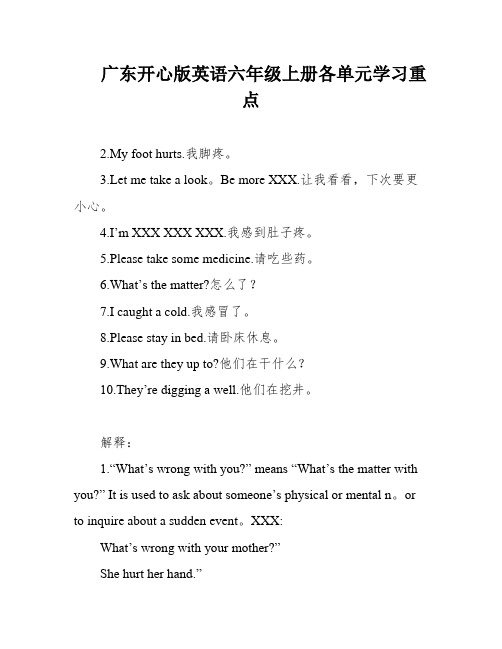
广东开心版英语六年级上册各单元学习重点2.My foot hurts.我脚疼。
3.Let me take a look。
Be more XXX.让我看看,下次要更小心。
4.I’m XXX XXX XXX.我感到肚子疼。
5.Please take some medicine.请吃些药。
6.What’s the matter?怎么了?7.I caught a cold.我感冒了。
8.Please stay in bed.请卧床休息。
9.What are they up to?他们在干什么?10.They’re digging a well.他们在挖井。
解释:1.“What’s wrong with you?” means “What’s the matter with you?” It is used to ask about someone’s physical or mental n。
or to inquire about a sudden event。
XXX:What’s wrong with your mother?”She hurt her hand.”2.“You should see the doctor” means that it is mended to go to the doctor for medical n.3.“My foot hurts” means that there is pain in the foot.4.“Let me take a look。
Be more careful next time” means that XXX injury。
and reminds the person to be more careful in the future.5.“I’m XXX” means that there is XXX.6.“XXX?” is another way to ask about XXX.7.“I caught a cold” means that someone has a cold or is experiencing cold-XXX.8.“Please stay in bed” is a XXX.9.“What are they up to?” is a way to ask about XXX.10.“They’re digging a well” means that they are digging a hole in the ground to access water.在问路时,询问某个地点的位置,常用句型为“Whereis/are + 地点?”3.Go XXX.直走,它在公园对面。
广东开心英语小学六年级上unit.ppt
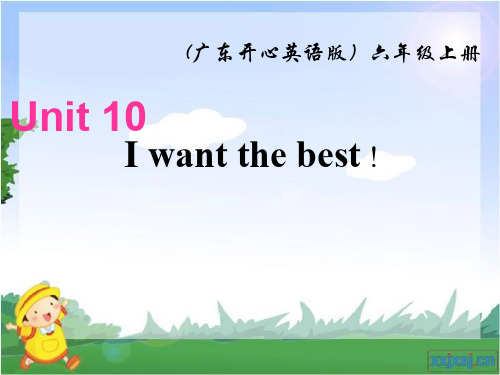
The moon is big. The earth is ______ . The sun is _____ _____
of the three .
He is _h_e_a_v_i_e_r than she. She is l_i_g_h_t_e_r_ than he. She is h_e_a_v__ie_r_ than it.
•in Guangzhou ( Beijing , Haerbin )
It’s cold.
Which is the coldest place ?
Haerbin is the coldest place .
• In winter, • Guangzhou is cold. • Beijing is colder than Guangzhou. • But Harbin is the coldest.
2
8yuan/a kilo
10yuan/a kilo
20 yuan/a kilo
3
The third chicken is cheap.
The second one is cheaper.
The first one is the cheapest of all.
Practice: Which is the … ?
• In summer, • Harbin is hot. • Beijing is hotter than Harbin. • But Guangzhou is the hottest.
Summer is hot. Summer is ________ than spring. Winter is cold. Winter is ________ than autumn.
广东版开心英语六年级上册全册教案
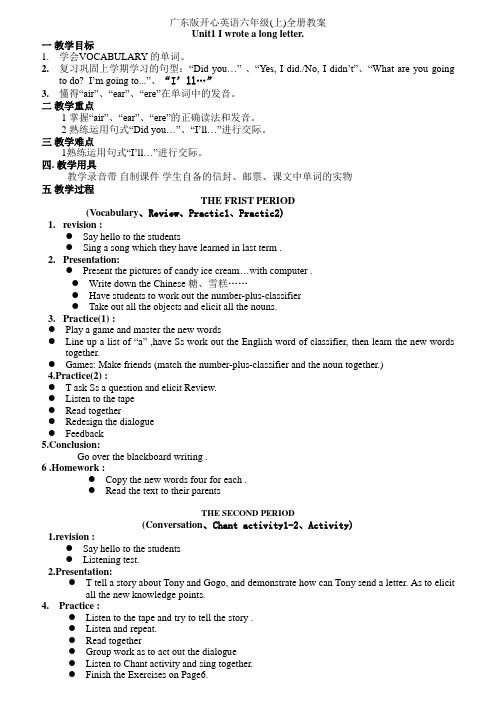
广东版开心英语六年级(上)全册教案Unit1 I wrote a long letter.一教学目标1.学会VOCABULARY 的单词。
2.复习巩固上学期学习的句型:“Did you…” 、“Yes, I did./No, I didn’t”、“What are you goingto do? I’m going to...”、“I’ll…”3.懂得“air”、“ear”、“ere”在单词中的发音。
二教学重点1 掌握“air”、“ear”、“ere”的正确读法和发音。
2 熟练运用句式“Did you…”、“I’ll…”进行交际。
三教学难点1熟练运用句式“I’ll…”进行交际。
四. 教学用具教学录音带自制课件学生自备的信封、邮票、课文中单词的实物五教学过程THE FRIST PERIOD(Vocabulary、Review、Practic1、Practic2)1.revision :●Say hello to the students●Sing a song which they have learned in last term .2.Presentation:●Present the pictures of candy ice cream…with computer .●Write down the Chinese 糖、雪糕……●Have students to work out the number-plus-classifier●Take out all the objects and elicit all the nouns.3.Practice(1) :●Play a game and master the new words●Line up a list of “a” ,have Ss work out the English word of classifier, then learn the new wordstogether.●Games: Make friends (match the number-plus-classifier and the noun together.)4.Practice(2) :●T ask Ss a question and elicit Review.●Listen to the tape●Read together●Redesign the dialogue●Feedback5.Conclusion:Go over the blackboard writing .6 .Homework :●Copy the new words four for each .●Read the text to their parentsTHE SECOND PERIOD(Conversation、Chant activity1-2、Activity)1.revision :●Say hello to the students●Listening test.2.Presentation:●T tell a story about Tony and Gogo, and demonstrate how can Tony send a letter. As to elicitall the new knowledge points.4.Practice :●Listen to the tape and try to tell the story .●Listen and repeat.●Read together●Group work as to act out the dialogue●Listen to Chant activity and sing together.●Finish the Exercises on Page6.●Comes to Activity on Page74.Conclusion:Go over the blackboard writing .5.Homework :●Read the text to their parents●Imitate the essay on page7 and rewrite a new one.THE THIRD PERIOD(Sounds and words、Listen and chant、workbook)1.revision :●Say hello to the students●Chant together as warm up.2.Presentation:●Listen to the tape and find out what the features are .●T demonstrate how to pronou nce “air” 、“ear”、“ere”.●Ss read it one by one .●Ss read the words freely, secondly ask them to set up more examples .3.Practice :●Listen to the tape and chant together .●Group work then make performance .4.Conclusion:Go over the blackboard writing .5.Homework :●Copy the words of “The sounds and words” (4 for each)●Read the text to their parentsUnit 2 I usually look for cookies.The first periodTeaching contents:V ocabulary and TargetTeaching key points:New words: never sometimes usually always subway bus taxi bikeHow do you get to school? I usually take the bus.Do you ever take a taxi to school? No! I never take a taxi to school.Teaching aids: recorder tape pictureTeaching procedure:一、T: How do you get to school?S: I walk get to school.(引导学生理解用 usually的含义)T: I usually get to school.二、利用卡片引导学生学习新的单词①I never take a bus to school.I sometimes take a taxi to school.I always ride a bike to school.从句子中学习单词的意思(引导学生学习词组:take a taxi \take a bus\ ride a bike \take a subway)②板书句子:How do you get to school?I usually take the bus.③ Read together and group by group④互相问答------进行小组中抽查掌握的情况。
最新广东版开心学英语六年级上册知识点整理
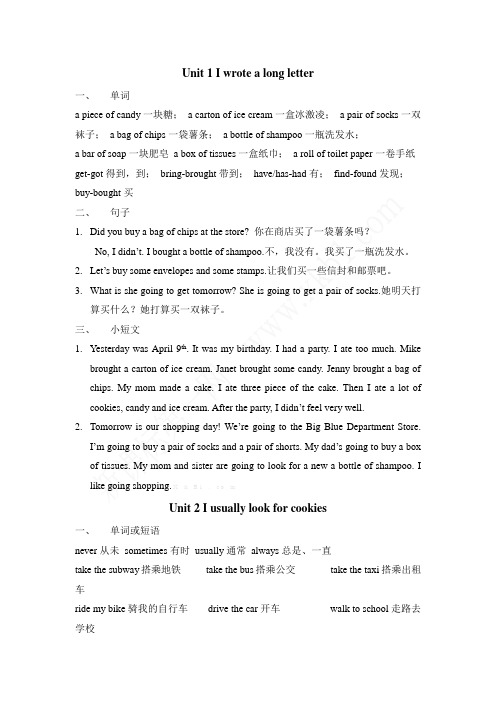
Unit 1 I wrote a long letter一、单词a piece of candy一块糖;a carton of ice cream一盒冰激凌;a pair of socks一双袜子;a bag of chips一袋薯条; a bottle of shampoo一瓶洗发水;a bar of soap一块肥皂a box of tissues一盒纸巾;a roll of toilet paper一卷手纸get-got得到,到;bring-brought带到;have/has-had有;find-found发现;buy-bought买二、句子1.Did you buy a bag of chips at the store? 你在商店买了一袋薯条吗?No, I didn’t. I bought a bottle of shampoo.不,我没有。
我买了一瓶洗发水。
2.Let’s buy some envelopes and some stamps.让我们买一些信封和邮票吧。
3.What is she going to get tomorrow? She is going to get a pair of socks.她明天打算买什么?她打算买一双袜子。
三、小短文1.Yesterday was April 9th. It was my birthday. I had a party. I ate too much. Mikebrought a carton of ice cream. Janet brought some candy. Jenny brought a bag of chips. My mom made a cake. I ate three piece of the cake. Then I ate a lot of cookies, candy and ice cream. After the party, I didn’t feel very well.2.Tomorrow is our shopping day! We’re going to the Big Blue Department Store.I’m going to buy a pair of socks and a pair of shorts. My dad’s going to buy a box of tissues. My mom and sister are going to look for a new a bottle of shampoo. I like going shopping. X k B 1 . c o mUnit 2 I usually look for cookies一、单词或短语never从未sometimes有时usually通常always总是、一直take the subway搭乘地铁take the bus搭乘公交take the taxi搭乘出租车ride my bike骑我的自行车drive the car开车walk to school走路去学校by bus/by bike/by car….by短语放在句尾二、句子1、How do you get to school? I usually take the bus.2、How does she get to work? She usually take the subway.3、How do they get to school? They always walk to school.4、Do you ever take a taxi to school?No, I don’t. I never take a taxi to school.5、Here we are. Let’s look for some insects.6、I think we’re lost. But I found some cookies.Unit 3 How often do you go hiking?一、单词及短语Once一次;twice两次;three times三次;go fishing钓鱼;go dancing去跳舞;go hiking去远足;go ice-skating去滑冰;go swimming去游泳。
广东开心英语小学六年级上语法知识gogo开心学英语版)
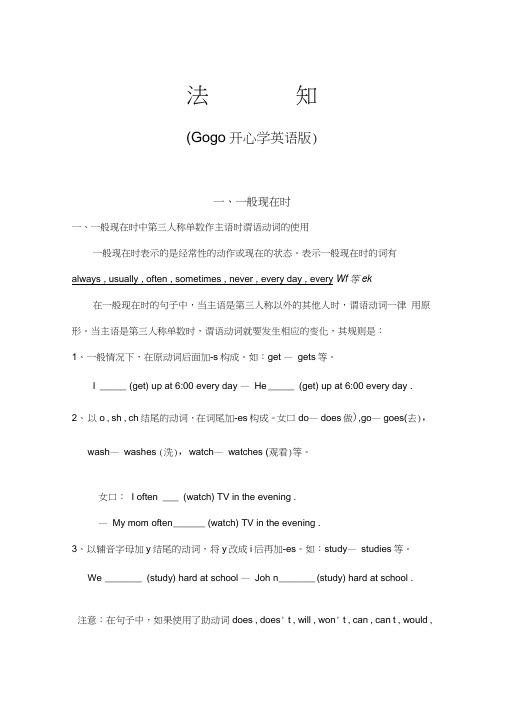
法知(Gogo开心学英语版)一、一般现在时一、一般现在时中第三人称单数作主语时谓语动词的使用一般现在时表示的是经常性的动作或现在的状态。
表示一般现在时的词有always , usually , often , sometimes , never , every day , every Wf等ek 在一般现在时的句子中,当主语是第三人称以外的其他人时,谓语动词一律用原形。
当主语是第三人称单数时,谓语动词就要发生相应的变化,其规则是:1、一般情况下,在原动词后面加-s构成。
如:get —gets等。
I _____ (get) up at 6:00 every day —He _____ (get) up at 6:00 every day .2、以o , sh , ch结尾的动词,在词尾加-es构成。
女口do—does做),go—goes(去),wash—washes (洗),watch—watches (观看)等。
女口:I often ___ (watch) TV in the evening .—My mom often ______ (watch) TV in the evening .3、以辅音字母加y结尾的动词,将y改成i后再加-es。
如:study—studies等。
We _______ (study) hard at school —Joh n _______ (study) hard at school .注意:在句子中,如果使用了助动词does , does' t , will , won' t , can , can t , would ,wouldn' t , must , mustn t等,尽管主语是第三人称单数,谓语动词也不用变化如:He doesn t ___________ (want ) to go shopping .Mike won' t __________ ( come ) to school tomorrow .二、现在进行时现在进行时表示现在进行或发生的动作。
- 1、下载文档前请自行甄别文档内容的完整性,平台不提供额外的编辑、内容补充、找答案等附加服务。
- 2、"仅部分预览"的文档,不可在线预览部分如存在完整性等问题,可反馈申请退款(可完整预览的文档不适用该条件!)。
- 3、如文档侵犯您的权益,请联系客服反馈,我们会尽快为您处理(人工客服工作时间:9:00-18:30)。
开心英语六年级上册总复习
Unit 1 Feeling Sick 感觉不舒服
句子详解:
1. What’s wrong with you? 你怎么了?
“What’s wrong with…?”意思是“......怎么了?”用来询问身体或精神状态,也可以用来询问突发事件,表示关心或问候。
同义句是“What’s the matter with…?”with是介词,后面要加名词或代词的宾格形式。
如:
---“What’s wrong with your mother? 你妈妈怎么了?
---She hurts her hand. 她伤着手了。
2. You should see the doctor. 你应该看医生。
should 是情态动词,没有人称和数的变化,后面加动词原形,句型结构:(1)肯定句:主语+ should +动词原形+其他。
(2)否定句:主语+ shouldn’t + 动词原形+其他。
(3)一般疑问句:Should + 主语+ 动词原形+ 其他?
He should stay in bed. He shouldn’t stay in bed. Should he stay in bed?
语法:Please +动词原形should+动词原形
be动词(am, is, are)+动词ing形式表示正在做什么
Unit 2 Looking for a hospital 找医院
句子详解:
1. Excuse me.对不起/打扰了/请原谅。
【辨析】Excuse me. 与Sorry.
“Excuse me. ”和“Sorry.”是日常会话中使用频率较高的口语,它们都可译为“对不起”。
“Excuse me. ”用来引起别人注意,也可表示礼貌,意为“对不起;请问;打扰了;劳驾”等,它是在给别人添麻烦之前说的话,是最普通的道歉用语。
“Sorry.”(=“I’m sorry.”通常用于表示由于某种过失或办不成某事的一种歉意。
2.Where’s the hospital?医院在哪里?
Where 意思是“在哪里”,常用来询问位置或地点。
当我们想要去某地却不知道地点时可以用句型“Where’s+ 地点?”来询问,回答时通常用“It’s +位置介词+参照地点.”如:
---Where is the bookstore?
---It’s next to the post office.
短语详解:
1.too much 太多的
Too much cola is bad for you.太多可乐对你有坏处。
【辨析】too much 和too many
too much后面加上不可数名词。
如:There is too much water here. 这里有太多的水。
too many后面加可数名词复数。
如:There are too many people in the bus.公共汽车上有太多的人。
句子详解:
What was your bedroom like this morning? 今天早上你的卧室怎么样?
What+ be 动词+主语+like…?意思是“…什么样?”用来询问人或物的外在特征或人的性格特点等。
Like 在这里作介词,意思是“…怎么样”。
当询问人或物过去的特征时be动词要用was/were。
如:
---What was the weather like?
--- It was cool.
---What were your shoes like?
--- They were clean.
语法:is的过去式是was,are 的过去式是were
Unit 5 A circus in the Park 公园里的马戏团
语音详解:
句子详解:
1.Where were you yesterday? 昨天你在哪里?
这是含有be 动词的一般过去时的特殊疑问句,where 意思是“哪里“,用来询问过去在哪里。
回答时用“主语+was/were+地点。
”如:
---Where was he last night? 昨天晚上他在哪里?
---He was at home. 他在家里。
---Where were Jenny and Tony yesterday? 昨天Jenny 和Tony 在哪里?
---They were in the circus park.
语法:1. 问对---的感觉--
What was …like? ……怎么样?It was...
2.Let’s +动词原形Let’s go to London!
3.There was +单数有……There was a big tree in the park last year.
There were+ 复数有……There were many birds in the park before.
Unit 6 Planting Trees 植树
语音详解:
ed发音口诀:清辅音念/ t / 元浊辅音念/ d/ t、d之后念/id/
语法:Did you+动词原形+时间?
肯定回答:Yes,I did./ Yes, we did.
否定回答:No,I didn’t. / No, we didn’t.
eg: Did you watch TV last night? Yes, I did./No, I didn’t.
Did you bug a hamburger yesterday? Yes, I did./ No, I didn’t.。
